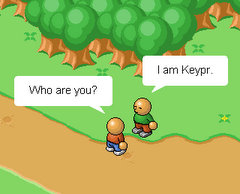The Logical Agents Project
The Logical Agents project builds an agent architecture based on automated reasoning in TAL. Logical Agents is a successor of the PARADOCS project.
Each agent is equipped with a knowledge base, i.e., a database of logical formulas that encode knowledge about the laws that govern the agent's world and its memory of recent events. Automated theorem proving is used for reasoning with the content of the knowledge base, answering questions, and planning actions.
Rather than working with an off-the-shelf resolution prover we have developed an automated natural deduction system. The proof rules used in natural deduction are more intuitive than many other systems, and the resulting proofs are more similar to human reasoning. Moreover, the rule set is extensible and can accommodate special purpose rules, e.g. for efficient temporal reasoning.
What we gain from the generality of logical reasoning is a simple but highly capable architecture where the many problems faced by partially or fully autonomous agents, including planning, are formulated in a unified way in terms of proof.
Issues investigated within the scope of the Logical Agents project include:
Methods for modeling an agent's incomplete knowledge about the world, including formalizing knowledge preconditions and knowledge-producing actions in extended versions of TAL.
The use of incompletely specified timing for actions.
The use of inductive proofs to generate plans ending in infinite loops, thereby solving certain classes of planning problems having temporally extended goals that can only be satisfied through continuous execution.
The integration of planning, execution, and plan revision.
The Logical Agents framework has been applied to both the UASTech UAV project and to the computer game application shown below.
Read more about Logical Agents at the Logical Agents site.
Computer Game Applications
Computer games can provide a natural environment in which to apply epistemic reasoning, where agents must generate plans given incomplete information and plan for knowledge acquisition. They can also provide a suitable testing ground for planning in the presence of agents that cannot be completely controlled by the planner, permitting experimentation in the areas of cooperation and delegation. We have developed a simple dialog-based adventure game based on Logical Agents, as seen in the picture. View a video or download and play the game prototype at the Logical Agents site.
We believe the Logical Agents architecture can be used to create game characters with a basic understanding of their environment that enables them to figure out what to do by themselves. Automated reasoning can be applied to answer novel questions in dialog and to plan actions in new situations, assisting in the creation of non-player characters with convincing behavior. Without such techniques, developing non-player character commonly involves an exhaustive specification of their actions in every conceivable situation that might arise. The process is laborious and the results do not apply in new and unforeseen circumstances.
Publications
Page responsible: Patrick Doherty
Last updated: 2014-04-30



